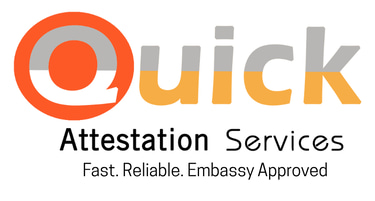Attestation vs Apostille: Which Do You Need?
Confused about attestation vs apostille for your documents? Discover the key differences and find out which process you need for your attestation documents or apostille documents to ensure their acceptance abroad.
7/4/20254 min read


Understanding Attestation
Attestation refers to the formal process of verifying the authenticity of a document, affirming that it is genuine and has been executed appropriately by the designated parties. This procedure serves a critical purpose, particularly in international dealings where documents need to be recognized by foreign entities. Attestation is essential for a wide range of documents, including educational qualifications, marriage certificates, commercial agreements, and corporate documents. Such verification can ensure that legal documents are accepted abroad and hold the expected weight in official proceedings.
The process of obtaining an attestation generally involves several steps. Initially, the document in question must be verified by the local issuing authority, which might include government departments or educational institutions, depending on the nature of the document. Once verified, the document must then be taken to the Ministry of External Affairs (MEA) or a relevant governmental body that oversees attestation services. Each issuing authority has specific guidelines and requirements, which may influence the duration and complexity of the process.
The timeline for completing the attestation process can vary significantly based on factors such as the type of document, the specific procedures of the issuing authority, and the demand for services at that time. Typically, this process may take anywhere from a few days to several weeks. Understanding attestation is particularly vital for expatriates, students seeking education abroad, and businesses engaging in international trade. For instance, a student planning to study overseas must have their academic transcripts attested to ensure their validity and acceptance by foreign educational institutions. Similarly, businesses that operate internationally often need to have their corporate documents attested to conduct transactions smoothly across borders.
What Is an Apostille?
An apostille is a specialized form of certification for documents, enabling their recognition in foreign countries that are signatories to the Hague Convention of 1961. Unlike typical domestic notarization processes that validate signatures and identity within a specific jurisdiction, an apostille serves a more international purpose. This legal certification ensures that public documents issued in one country are accepted without the need for further authentication when presented in another member country.
The primary function of an apostille is to simplify the procedure of document verification for international use. For instance, documents such as birth certificates, marriage licenses, and educational diplomas may require an apostille when individuals seek to validate their authenticity abroad. The access to this streamlined process is critical for those relocating, studying, or working overseas, diminishing the bureaucratic hurdles associated with international document verification.
The Hague Convention of 1961 introduced this efficient system to address the complexities of document certifications and to eliminate the need for cumbersome legalization by consulates or embassies. By standardizing the verification process among the signatory nations, the convention facilitates smoother interactions and agreements between countries, making it easier for individuals to navigate the legal requirements abroad.
In summary, obtaining an apostille signifies that a document is legally valid and can be recognized in other nations, provided those nations are participants in the Hague Convention. Understanding what documents necessitate this form of certification is essential, especially for individuals engaging in international activities, as it lays the groundwork for acceptance and legality of various personal and professional documents across borders.
Key Differences Between Attestation and Apostille
The distinctions between attestation and apostille are crucial to understand when considering document authentication. Attestation encompasses a broader range of verification processes that individual countries utilize to validate documents for use abroad. In contrast, an apostille is a specific form of authentication recognized under the Hague Convention of 1961, aimed primarily at simplifying the process for documents moving between member countries. While both serve the common goal of validating the legitimacy of documents, their applicability and processes differ significantly.
When looking at the processes involved, attestation typically requires several steps. It may involve obtaining verification from the document issuer, followed by confirmation from local government authorities. This rigorous process can vary depending on the specific requirements of the destination country. Conversely, the apostille process is more straightforward, involving a single certificate that authenticates the signature and seal of a public official, thereby eliminating the need for additional verifications for documents being sent to another Hague member state.
The intended purpose and jurisdiction also highlight differences between the two methods. For instance, attestation is often the preferred choice for countries that are not part of the Hague Convention, as these countries might not accept apostilles. This is particularly relevant in legal and administrative matters where documents must be validated in a country-specific manner. In contrast, apostille is generally accepted in countries that have ratified the Hague Convention, facilitating smoother transactions and recognition of documents without further authentication.
In summary, understanding the key differences between attestation and apostille enables individuals to choose the appropriate document authentication method based on their unique circumstances, such as the destination country and the nature of the documents involved. This informed decision-making is essential for ensuring that documents are recognized and accepted in international contexts.
How to Decide: Attestation or Apostille?
When faced with the decision of whether to obtain an attestation or an apostille for your important documents, several critical factors must be considered. The first step is to identify the destination country where the documents will be used. Attestation and apostille serve different legal functions depending on the country, as some nations are signatories to the Hague Convention, allowing for the use of apostilles, while others may require attestation through their respective embassies or consulates.
Next, evaluate the type of document you are dealing with. Common documents that may require either attestation or apostille include birth certificates, marriage certificates, diplomas, and business contracts. Certain documents, like educational credentials, may necessitate apostille if they are to be used in countries that recognize this form of certification. On the other hand, legal documents intended for non-Hague Convention countries will primarily require attestation.
The purpose of the document also plays a vital role in determining the right process. If the document is to be used for employment, immigration, or legal purposes, understanding the requirements of the specific foreign entity or institution can clarify which certification method is acceptable. Additionally, if both processes are needed, it is essential to follow the correct order: typically, a document will first undergo attestation before it can be apostilled.
Practical examples can illuminate these decisions. For instance, a graduate looking to work abroad may need to apostille their academic credentials for a job application in a Hague Convention country, whereas an individual planning to marry in a country that requires attestation must seek that specific authentication. By assessing these elements carefully, individuals can navigate the complexities of international document requirements effectively.
